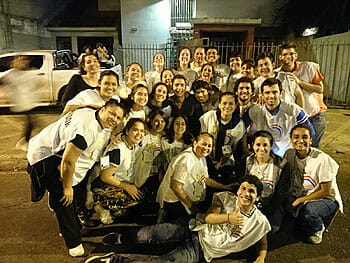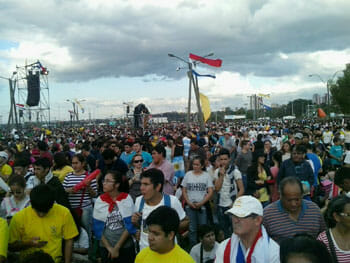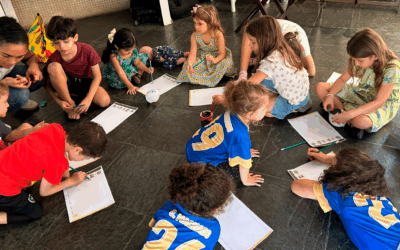 Ore aguije Papa Francisco pe, ha peeme avei pe ñembo’ehaguere ore rehe. In the Guaraní language: «Our thanks to Pope Francis and to all of you for your prayers.» «As we had imagined, overflowing graces have fallen on the entire Paraguay people, ever since His Holiness was here among us,» Nelson Benítes and Margarita Ávalos, heads of the Focolare in Paraguay wrote, after the Pope’s visit to their country. «The children, the sick and the youth were the main protagonists of the visit. Over 80,000 “servidores” (“stewards” – almost all young people) from all over the country worked day and night for three days. But the preparations started at least three months earlier, a concrete fact that gives true hope!» Nahuel Espinola recounts: «I was a ”servidor” of the Pope – It was simply fantastic! I’m 15 and I don’t know when I shall experience something like this again. I hope that his message will reach all the youth.» «There was instant bond with the people,» and some scenes will never be deleted from my mind: the children of the choir of Luque running towards Pope Francis for a group embrace, the thousands of people who filled the streets, his car stopping in front of the women’s jail. «When they found out that the Pope was coming, the children afflicted with cancer in a hospital did not want to be discharged!». Then there was the visit to “Bañado Norte,” one of the poorest districts of the capital, where the Pope visited a sick woman at home. «For that event, she had prepared the “chipa” and “sopa paraguaya,” typical dishes the Popes likes. This was followed by the surprise visit to the parish of Cristo Re, to pay homage to the still intact heart of the martyr and first Paraguayan saint: San Roque González de Santa Cruz.» In Caacupé, Pope Francis consecrated Paraguay entirely to Mary. Then came the meeting with civil society, one of the most striking moments when he launched a discourse on dialogue, inviting all to dialogue, by losing all in order to understand the other, and “enter” into the other. «Concepts like the humane side of development, giving priority to the person, and not treating the poor like objects, impressed me deeply,» affirmed Julia Dominguez, a member of the Economy of Communion of Paraguay, «From now on, we must not dwell on sentimentalism, but live this daily.» César Romero, active in the association for families added: «In the dynamism and freshness of the programme, I saw a Church that was making a big effort to update itself in its methods and messages.» Silvano Malini, a journalist in Paraguay wrote: «In these three countries of the Latin American “periphery,” Pope Francis decisively stood on the side of the “rejects” of society and victims of injustice and inequality, but in doing so did not “attack” anyone but human miserliness – the only sources of the serious and dramatic problems of this country (corruption, egoism, low-quality democracy).» Malini went on to say: «The Pope’s exhortations fell on soil tilled by the Church in Paraguay, as could be seen in the meeting with the representatives of over 1,500 civil society organizations. Pope Francis, with authority, gave an example of concrete dialogue which is not easy but does help to make small but sure steps towards a common project. »
Ore aguije Papa Francisco pe, ha peeme avei pe ñembo’ehaguere ore rehe. In the Guaraní language: «Our thanks to Pope Francis and to all of you for your prayers.» «As we had imagined, overflowing graces have fallen on the entire Paraguay people, ever since His Holiness was here among us,» Nelson Benítes and Margarita Ávalos, heads of the Focolare in Paraguay wrote, after the Pope’s visit to their country. «The children, the sick and the youth were the main protagonists of the visit. Over 80,000 “servidores” (“stewards” – almost all young people) from all over the country worked day and night for three days. But the preparations started at least three months earlier, a concrete fact that gives true hope!» Nahuel Espinola recounts: «I was a ”servidor” of the Pope – It was simply fantastic! I’m 15 and I don’t know when I shall experience something like this again. I hope that his message will reach all the youth.» «There was instant bond with the people,» and some scenes will never be deleted from my mind: the children of the choir of Luque running towards Pope Francis for a group embrace, the thousands of people who filled the streets, his car stopping in front of the women’s jail. «When they found out that the Pope was coming, the children afflicted with cancer in a hospital did not want to be discharged!». Then there was the visit to “Bañado Norte,” one of the poorest districts of the capital, where the Pope visited a sick woman at home. «For that event, she had prepared the “chipa” and “sopa paraguaya,” typical dishes the Popes likes. This was followed by the surprise visit to the parish of Cristo Re, to pay homage to the still intact heart of the martyr and first Paraguayan saint: San Roque González de Santa Cruz.» In Caacupé, Pope Francis consecrated Paraguay entirely to Mary. Then came the meeting with civil society, one of the most striking moments when he launched a discourse on dialogue, inviting all to dialogue, by losing all in order to understand the other, and “enter” into the other. «Concepts like the humane side of development, giving priority to the person, and not treating the poor like objects, impressed me deeply,» affirmed Julia Dominguez, a member of the Economy of Communion of Paraguay, «From now on, we must not dwell on sentimentalism, but live this daily.» César Romero, active in the association for families added: «In the dynamism and freshness of the programme, I saw a Church that was making a big effort to update itself in its methods and messages.» Silvano Malini, a journalist in Paraguay wrote: «In these three countries of the Latin American “periphery,” Pope Francis decisively stood on the side of the “rejects” of society and victims of injustice and inequality, but in doing so did not “attack” anyone but human miserliness – the only sources of the serious and dramatic problems of this country (corruption, egoism, low-quality democracy).» Malini went on to say: «The Pope’s exhortations fell on soil tilled by the Church in Paraguay, as could be seen in the meeting with the representatives of over 1,500 civil society organizations. Pope Francis, with authority, gave an example of concrete dialogue which is not easy but does help to make small but sure steps towards a common project. »  «At campo Ñu Guasú, a million faithful awaited him. The sun shone on the crowd that had been waiting for 15 hours in the mud, because it had rained over the last few days. But nothing could stop the celebrations.» Esteban Echagüe recounted: «Neither the mud nor the weariness could deter the immense joy we all felt. I was so struck by the Pope’s affirmation that the parishes should really be places of encounter with one’s brethren, and a place of acceptance and fraternity, and if this is not so, we would not be true Christians.» «After a brief but intense moment with the Paraguay bishops, the Pope “miraculously” regained his strength to resume his pastoral journey! One could feel that he was tired as was natural for a 78 year old! But everyone was convinced that in front of the youth, Francis would be transformed.» In fact, more than 200,000 were waiting for him along the Paraguay River! He asked all to have a free heart and furthermore…, «continue to raise a “ruckus” but an organized one.» Leonor Navaro confided: «The Pope aroused in the youth and in all, the desire to be better… because he saw us the way we should be – and through his eyes the world discovered us as such. From now on we want to reflect ourselves in his eyes!» Along the way back to the airport, he was moved upon blessing a place which is a really painful symbol for the country: the remains of a commercial center where ten years ago, around 400 people died in a fire. Nelson and Margarita continued: «Through Bishop Adalberto Martínez, Secretary General of the Episcopal Conference of Paraguay, we wrote to the Pope that the Focolare Movement is praying for him. We had sent him a gift of a book on the Guaranì culture and on the development of Economy of Communion in the country. To conclude: «This visit, like that of Pope John Paul 27 years ago, will bring about vital and positive outcomes and spiritual effects also in the civil life of the country. Pope Francis was very clear in his words, but conveyed them with the tenderness of a Father! It is now up to them to make use of these moments of grace, “a before and an after” of the first visit of a Latin American Pope to Paraguay».
«At campo Ñu Guasú, a million faithful awaited him. The sun shone on the crowd that had been waiting for 15 hours in the mud, because it had rained over the last few days. But nothing could stop the celebrations.» Esteban Echagüe recounted: «Neither the mud nor the weariness could deter the immense joy we all felt. I was so struck by the Pope’s affirmation that the parishes should really be places of encounter with one’s brethren, and a place of acceptance and fraternity, and if this is not so, we would not be true Christians.» «After a brief but intense moment with the Paraguay bishops, the Pope “miraculously” regained his strength to resume his pastoral journey! One could feel that he was tired as was natural for a 78 year old! But everyone was convinced that in front of the youth, Francis would be transformed.» In fact, more than 200,000 were waiting for him along the Paraguay River! He asked all to have a free heart and furthermore…, «continue to raise a “ruckus” but an organized one.» Leonor Navaro confided: «The Pope aroused in the youth and in all, the desire to be better… because he saw us the way we should be – and through his eyes the world discovered us as such. From now on we want to reflect ourselves in his eyes!» Along the way back to the airport, he was moved upon blessing a place which is a really painful symbol for the country: the remains of a commercial center where ten years ago, around 400 people died in a fire. Nelson and Margarita continued: «Through Bishop Adalberto Martínez, Secretary General of the Episcopal Conference of Paraguay, we wrote to the Pope that the Focolare Movement is praying for him. We had sent him a gift of a book on the Guaranì culture and on the development of Economy of Communion in the country. To conclude: «This visit, like that of Pope John Paul 27 years ago, will bring about vital and positive outcomes and spiritual effects also in the civil life of the country. Pope Francis was very clear in his words, but conveyed them with the tenderness of a Father! It is now up to them to make use of these moments of grace, “a before and an after” of the first visit of a Latin American Pope to Paraguay».
Spread real love everywhere
Spread real love everywhere




0 Comments